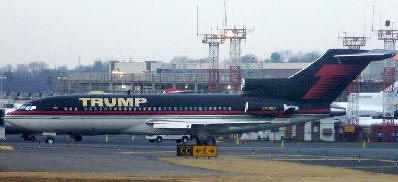
 |
|
|
|
|
||||
|
History Of Trump Shuttle |
||||
 |
Trump Shuttle, Inc., doing business as Trump Airlines, was an airline owned by Donald Trump from 1989 to 1992. The landing rights and some of the physical assets necessary to operate the shuttle flights were originally part of Eastern Air Lines and known as the Eastern Air Shuttle.
It operated hourly flights of Boeing 727 aircraft from |
|||
|
It organized its
profitable Northeastern air shuttle operation into a separate company
headed by Bruce Nobles with the intent of selling it to raise cash. On
October 5, 1988, amidst a prolonged
threatened mechanics strike action, real estate mogul Donald Trump
arranged to purchase the shuttle. In June, 1989 the deal was completed,
financed through a $380 million loan from a syndicate of 22 banks. The
new airline began service as Trump Shuttle on June
23. Its IATA designator code was 'TB', which has since been
assigned to Jetairfly Trump pushed to make the new shuttle a luxury service
and a marketing vehicle for the Trump name. Its aircraft were newly
painted in white livery and the interiors redecorated with such features
as maple wood veneer, chrome seat belt latches, and gold colored
lavatory fixtures. The airline also was a leader in the adoption of
advanced technologies; it introduced some of the first passenger
self-service check-in kiosks in coordination with Kinetics at its
LaGuardia base and partnered with LapStop, a startup firm which rented
laptop computers to passengers. Trump's previous experience with airlines was
operating a scheduled helicopter service to Almost from its inception, the company encountered
financial problems. The Shuttle's core passengers chose it for its
convenience, not its costly luxury features, and during the prolonged
labor strike at Eastern Shuttle many defected to the competing Pan Am
Shuttle or to Amtrak's Metroliner service. In late 1989 the U.S.
Northeast entered an economic recession which depressed demand, while
the August 1990 Iraqi invasion of Trump Shuttle never turned a profit. The high debt load incurred in the company's formation unnerved Trump's creditors as his other high profile, highly leveraged interests failed. In September 1990 the loans were defaulted and ownership of the airline passed to its creditor banks, led by Citicorp. With airline share prices depressed by the recession and anticipation of the Gulf War, they were unable to sell the operation at a desired price despite lengthy negotiations first with Northwest Airlines, then American Airlines and US Air Group. |
||||
|
The banks finally negotiated a complex marketing
arrangement in which US Air Group would assume 40% ownership and agree
to manage the operation for ten years, including fares, financial record
keeping, advertising, promotions, aircraft maintenance, and labor
relations. The same agreement gave USAir an option to purchase the
entire shuttle operation on or after
October 10, 1996 with an exclusive right
to do so until April 10,
1997. On April 7,
1992 Trump Shuttle ceased to exist when it was merged into a new
corporation, Shuttle, Inc., which began operating as the USAir Shuttle
on April 12, 1992. The demise of the shuttle almost meant a demise of
Trump's scheduled helicopter service to |
| ŠAvStop Online Magazine Contact Us Return To News |